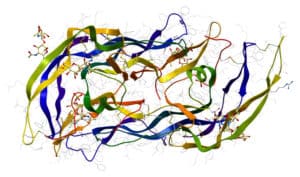
The breakthrough opens doors to further explore the intricacies about how proteins behave and their multifaceted roles in molecular biology.
Proteins are known for typically precise structures, but a unique class known as intrinsically disordered proteins challenges the conventional structure-function relationship. They lack a fixed form, with some regions in perpetual motion. Scientists have long wondered whether this disorder was a quirk or a vital aspect of their function. But recently published research harnessing Google’s AlphaFold AI software may finally help unravel the mystery.
Why intrinsically disordered proteins have been such a mystery
Intrinsically disordered proteins feature elusive regions that defy traditional structural analysis, indicating constant fluctuations. Scientists recognized that this intrinsic disorder was not an experimental quirk but a fundamental part of these proteins’ behavior.
To demystify the role of intrinsically disordered proteins, Chinese researchers delved into protein 4.1G, essential for cell division due to its interactions with NuMA, another disordered protein. Both possessed interaction regions but lacked fixed structures. The scientists analyzed these structures using various techniques, including mutational analysis and molecular dynamics simulations. However informative, these techniques offered limited insights.
See also: DeepMind Massively Expands Protein Structure Database
AlphaFold helps unlock the secrets
Enter Google’s AlphaFold AI software. AlphaFold unveiled a specific structure within these intrinsically disordered regions by predicting protein complex configurations. This revelation helped explain why these regions remained disordered even without interactions.
This newfound comprehension sheds light on why evolution may favor intrinsically disordered proteins over their well-structured counterparts. Proteins like 4.1G act as versatile bridges, producing interactions with numerous partners and orchestrating complex assemblies. Their intrinsic disorder provides the flexibility needed to engage various interaction partners, facilitating the formation of diverse protein complexes.
While not all intrinsically disordered proteins may adopt structured interactions, this research demonstrates the possibility of ordered structures within this enigmatic category. Furthermore, it underscores the invaluable role played by AlphaFold AI in tackling intricate biological questions that have perplexed scientists. This breakthrough opens doors to further explore the intricacies of protein behavior and their multifaceted roles in molecular biology.


























